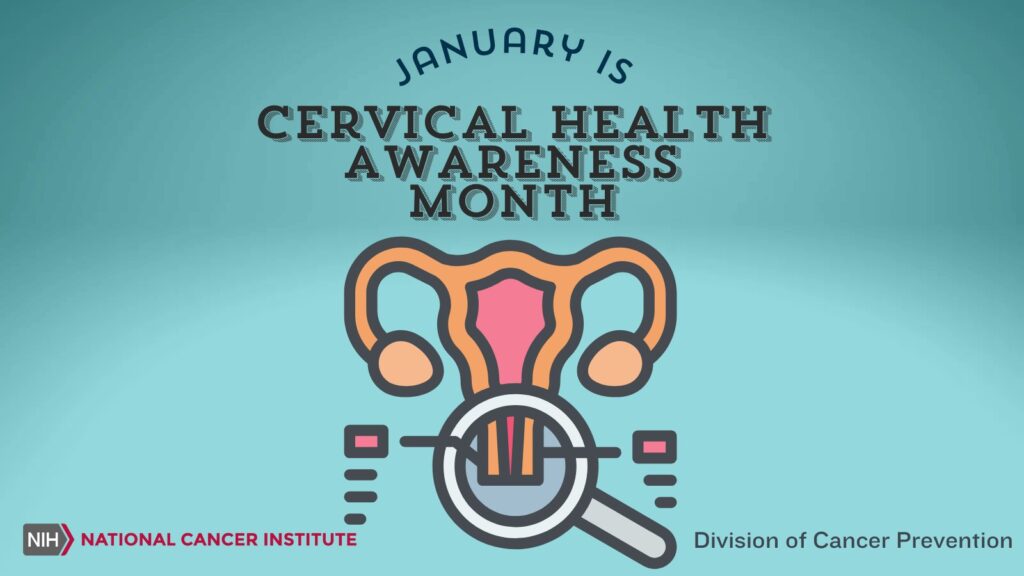
Photo courtesy of the National Cancer Institute
January is Cervical Cancer Awareness Month. Cervical cancer is a serious condition, but also one of the most preventable and treatable forms of cancer. According to the Centers for Disease Control (CDC), about 11,500 new cases of cervical cancer are diagnosed each year in the United States.
In this article, I will discuss ways to prevent and detect cervical cancer, but first, let’s do introductions; meet the cervix! The cervix is the narrow part of the uterus, the pear-shaped organ of the female reproductive system. The cervix is a type of sphincter, a circular muscle that can tighten or relax to allow things to pass. Beyond the cervix is the vagina.
You may be familiar with the cervix from getting swabbed during a pap smear, feeling it while using a tampon, checking the placement of an IUD, or from vaginal sexual activity. You may also know it opens slowly (dilates) during labor before childbirth. The cervix feels a bit like the tip of your nose!
What you may not know is that the healthy cells of the cervix can become unhealthy, and the cervix can develop cancer. Fortunately, there are ways to prevent and detect cervical cancer: the Human Papilloma Virus (HPV) vaccine, the pap smear, and the HPV test.
PREVENT HPV with the HPV Vaccine
HPV plays a role in most cases of cervical cancer. HPV is a sexually transmitted infection (STI) passed through sexual contact. Most folks who’ve had more than one sexual partner in their lifetime will get HPV.
For most people, HPV is no sweat and the body’s immune system clears the virus. For some, the virus causes cells of the cervix to become cancer cells. It can also cause cancers in the vagina and vulva, the penis, and the mouth. The great news is the HPV vaccine prevents most strains of HPV!
Experts recommend giving the HPV vaccine to boys and girls at 11 or 12 years of age to prevent contracting HPV once they become sexually active. You can also get the vaccine later in life. Many people have mixed feelings about vaccines for themselves and their young ones. Check out this decision-making tool from Montefiore here that will help you explore those feelings and make healthy decisions.
DETECT Changes to the Cervix with Pap Smears
Cervical cancer develops slowly, which means it can be spotted and treated in its earliest stages. Reader, meet the Pap smear: a test that spots changes in the cervix cells. During a Pap smear, a healthcare provider inserts a swab into a patient’s vagina and sweeps the cervix, where it collects cells. Those cells are analyzed, and abnormal cells can be treated in various ways. Sadly, most women who are diagnosed with cervical cancer today have not had regular Pap smears or have not received care after an abnormal Pap result.
Many folks skip recommended Pap smears because they feel uncomfortable or nervous about them. People who have experienced unwanted sexual touching may avoid Pap smears and other pelvic exams because the physical contact leads to panic and stress.
Click here to learn more about how survivors of sexual abuse can prepare for pap smears and visits to the gynecologist.
Other people forget to schedule their exams at the recommended times or struggle to get time off work. Patient portals like Montefiore’s My Chart, automatically remind patients of the need to schedule regular Pap smears, HPV tests, and vaccines. The portal allows patients to see the results of past Pap smears, which determines the timing of the next screening.
DETECT HPV with the HPV Test
The HPV test looks for the strains of HPV that are most likely to cause cancer. It’s a newer test than the Pap smear and can alert people with HPV about their higher risk of getting cancer in the future and the need for more screening. Visit https://www.acog.org/womens-health/infographics/cervical-cancer-screening or google “ACOG cervical cancer infographic” to learn how often women should get HPV tests and Pap smears.
The cervix deserves your care and protection. Remember, cervical cancer develops slowly and can be spotted with a pap smear and treated early. The HPV vaccine can prevent you from getting HPV, an extremely common STI that causes cancers of the genitals and mouth in men and women.
To get a pap smear or treatment for abnormal pap results, contact Montefiore’s OBGYN team here and visit Montefiore’s Cancer Screening website here. For more information about the HPV vaccine, speak to your doctor or your children’s doctor.
Claire Garon MPH, CLC is a senior health educator with the Office of Community & Population Health at Montefiore Health System.




